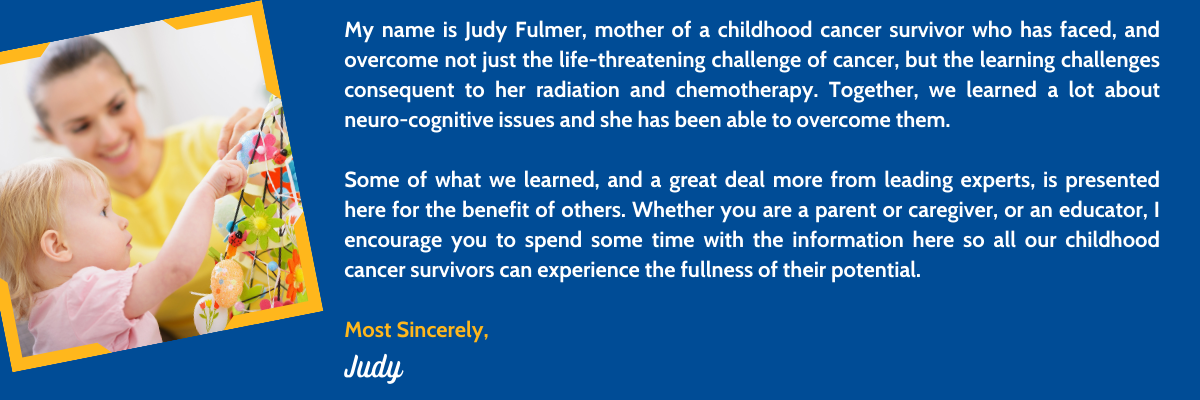Childhood Cancer Education Toolkit for Schools and Educators
You Have a Child in Your Class or Your School with Cancer
What do you need to know? What to look for? What is your responsibility to this child and their family?
Most childhood cancer patients will experience one or more chronic and often lifelong health issues that affect learning abilities. Their return to the normalcy of school, friends, and activities will be a joyous time but also a time to be alert for changes in their ability to process information and learn.
OVERVIEW
More than 700 Carolina children will be diagnosed with cancer annually – it is the leading disease killer of children and youth ages birth to 18 in America. They will join thousands already undergoing treatment or making their way in survivorship.
Treatment methods vary depending on the type of cancer, as does the treatment length, which may extend 18-24 months or longer. One child may have surgery and then require no further treatment, while another child may have surgery, followed by chemotherapy, radiation, and sometimes a bone marrow transplant. The cure rate for childhood cancer is better than ever before, with some types of cancer being at a 95% success rate or better.
Treatment can be long, rigorous, and debilitating. Following treatment, both children and teens can suffer from late effects of treatment that include many physical, cognitive, psycho-social, and emotional challenges. These challenges must be addressed before transitioning back to school. The transition back to school can be challenging. However, with the medical team, parents, and school team working together in a strong partnership, children and teens can successfully reintegrate back into school. This educational toolkit is designed to assist school personnel, parents, and the medical team with information and forms to make the transition easier.
- Slower processing speed – it may take the student a little longer to understand things
- Short-term memory loss
- Inability to focus or concentrate for long periods of time
- Poor organization skills – remembering to do homework, and bring it to school
- Difficulty multitasking – maybe not listening to you while writing things down
- Visual-spatial deficits – maybe bumping into things, or not seeing screen content as well
- Difficulty remembering words
Resources:
National Institute of Health
NIH Study Links Childhood Cancer to Delays in Developmental Milestones
National Association of School Psychologists
Late Effects of Childhood Cancer: Implications for School Psychologists
Psycho-social and emotional challenges can wax and wane for children facing cancer diagnosis and treatment. The following list addresses some of their most common challenges:
- Lack of exposure to playgroups, sports, and other extracurricular activities
- Loss of contact with friends and peers
- Variation in maturity levels
- Desire for independence
- Need for acceptance
- Finding a social group in which to belong
- Quest for normalcy
- Feelings of being different
- Emotions including sadness, fear, guilt, anger, worry, anxiety, loss and grief
First and foremost, connect with the family to understand the circumstances and gauge the student’s needs – e.g. home schooling, extended absence, limited or intermittent attendance.
Form a strong support system and partnership with your student, their medical team, and their parents or caregivers. Your school may have its school health plan for special needs situations. It addresses the diagnosis and medications that may need to be given at school, procedures that may need to be addressed at school, and accommodations required for the school setting for the medical condition.
Determine if a formal educational plan is warranted, which may be unfamiliar to the parents. This may be a 504 Plan as defined in Section 504 of the federal Rehabilitation Act, or an IEP (Individualized Education Program).
- A 504 Plan may be beneficial when a student succeeds in a general education setting but exhibits some late effects related to the medical diagnosis and treatment.
- An IEP, Individualized Education Plan, is needed when they need specialized instructions due to the physical, cognitive, or psychosocial-emotional challenges they are experiencing following treatment.
Consider the value of some in-service briefing for school staff and classmates that may help them become valuable to your support system. This type of informational session can help explain why special consideration and patience can help your student, their classmate, feel welcome.
Transition goals might be especially helpful, as the transition back to the classroom can be difficult for any student who has been away for an extended period, but especially for students who have experienced the diagnosis, trauma, and treatment of childhood cancer. Helping them achieve small, attainable goals is always beneficial.
Message from A Mother

